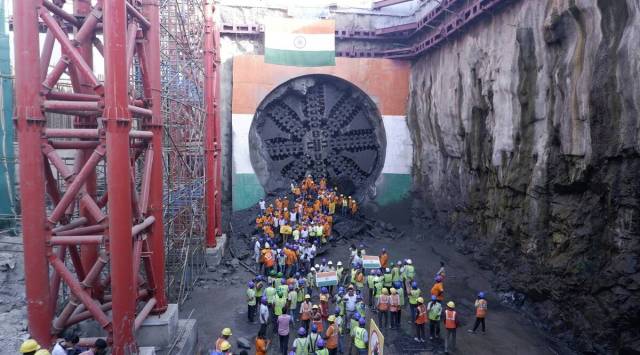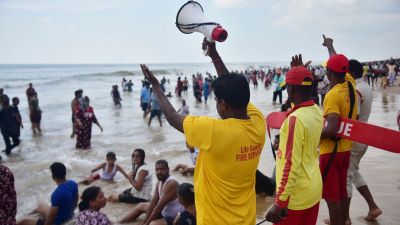Mumbai Ahmedabad Bullet train project: Largest TBM to dig India’s first undersea rail tunnel next year
The National High Speed Rail Corp. Ltd has inked an agreement with Afcons Infrastructure to construct the 21-km stretch, which includes the 7-km-long undersea rail tunnel.
 File photo of an undersea tunnel, a part of the Mumbai Coastal Road, being completed by TBM Mavala. (Express photo by Pradip Das)
File photo of an undersea tunnel, a part of the Mumbai Coastal Road, being completed by TBM Mavala. (Express photo by Pradip Das) One of the largest Tunnel Boring Machines (TBMs) will be deployed by next year for digging India’s first undersea rail tunnel as a part of the Mumbai-Ahmedabad bullet train project.
Earlier, the country’s largest TBM of 12.2 meters diameter was used for the Mumbai Coastal Road project, but the TBM being to be used for Mumbai-Ahmedabad bullet train project will be even larger with a diameter of 13.1 meters.
20 Tunnel Boring Machines (TBMs) will be deployed by Afcons for various underground projects this financial year. “A total of 17 TBMs are being mobilised this year and three more will be deployed early next year,” V Manivannan, Afcons’ Director, Construction Plant and Equipment (CPE), said. “We own all these TBMs, and we are probably the only organisation in the country, at present, to own and deploy so many TBMs at a time,” he added.
The National High Speed Rail Corporation Limited (NHSRCL) recently signed a contract with Afcons for constructing India’s first undersea rail tunnel, which is part of a 21-kilometre-long tunnel for the Mumbai-Ahmedabad bullet train project. The undersea tunnel at Thane creek will be seven-kilometres-long and around 25 to 65 metres below the ground level. Sixteen kilometres of the tunnel will be executed using TBMs and five kilometres will be constructed with the new Austrian Tunnelling Methodology.
“Our equipment fleet is strategic, not generic in nature. Most of our equipment are custom built and that’s why we are capable of taking on technically challenging projects, and complete them on time or ahead of schedule,” Manivannan said.
Considering that the undersea portion of the tunnel will fall under the inter-tidal zone, it is possible that the water pressure could be high leading to extremely high overburden. However, Afcons has previously executed underwater tunnelling projects and has the credential of constructing the country’s first underwater Metro tunnels below a river in Kolkata. Afcons constructed three underground Metro stations which are joined by two underground tunnels of 3.8 kilometres each. A portion of the tunnels — nearly 520 metres — is under the mighty river Hooghly.
The Mumbai-Ahmedabad tunnelling package is an added challenge as the alignment between Bandra Kurla Complex and Vikhroli passes through a highly urbanised area making underground tunnelling a tricky affair. The shaft excavations could prove challenging, too, since the shaft depths could go beyond 50 metres, according to Afcons.







